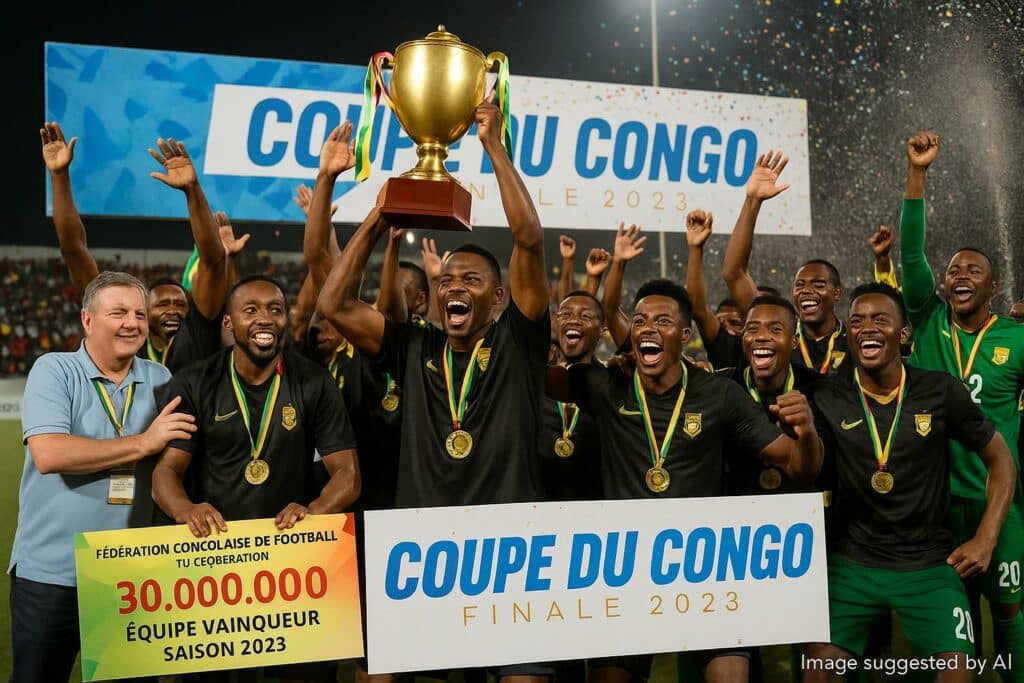A Symbol Born of Nation-Building
Since its formalisation by Decree n° 85-1410 in December 1985, the Coupe du Congo has operated as more than an annual sporting fixture; it has been a civic ritual entwined with the 15 August independence celebrations. Successive finals, traditionally presided over by the Head of State or his envoy, have reinforced the event’s role as a unifier, portraying football as a soft-power instrument capable of melding regional identities into a single national narrative (UNESCO report on Sport and Peace, 2023).
The competition’s post-civil-war relaunch in 2000 symbolised societal renewal. Classics between AC Léopards, Diables Noirs, Cara and Étoile du Congo populated collective memory, each final simultaneously inaugurating newly built venues and signalling the country’s return to domestic normality. The cup’s trajectory, therefore, mirrors broader state efforts to consolidate peace through cultural diplomacy.
Infrastructure as a Vector of Cohesion
Over the past two decades the government’s accelerated municipalisation programme channelled significant capital into modern stadia from Dolisie to Owando. These arenas, equipped with FIFA-certified pitches, media facilities and community clinics, were conceived to democratise access to sport while stimulating local economies. As several analysts contend, the stadium network now rivals sub-regional standards and renders Congo-Brazzaville eligible for larger Confederation of African Football events (Africanews analysis, 15 August 2024).
Yet infrastructure alone cannot guarantee competitive excellence. Specialists frequently recall the axiom that ‘venues invite performance’, a maxim validated whenever cup finals attracted full houses and showcased professional management. The suspension of the tournament deprives these facilities of marquee occasions, limiting their catalytic function for youth development and urban tourism. Restoring the competition would allow public investment to yield its anticipated social dividend.
Administrative Turbulence and International Fallout
The interruption of the 2024 edition at the quarter-final stage, triggered by divergent readings of eligibility statutes among club officials, precipitated an eight-month impasse. Closure of stadiums, followed by the temporary FIFA suspension of the Congolese Football Federation (FECOFOOT), underscored the vulnerability of sports governance to procedural lapses (FIFA compliance notice, 2024).
This year’s formal cancellation, communicated on 3 July 2025 through the Ministry of Sports, has compounded scheduling difficulties. AC Léopards and AS Otohô, drawn against the Black Bulls of Mozambique and Primeiro de Agosto of Angola respectively, now confront continental qualifiers with scant match fitness. The national selection competing in the East African-hosted African Nations Championship similarly lacks a domestic talent pipeline, obliging coaches to rely on historical reputations rather than current form (CAF press release, 9 August 2025).
Reading the Voices of Stakeholders
Club executives lament revenue losses from gate receipts and sponsorship activation. ‘Our preparation cycle is disarticulated; commercial partners require visibility and certainty,’ AC Léopards President Rémy Ayessa affirmed in a recent radio interview (Les Dépêches de Brazzaville, 11 August 2025). Player representatives echo concerns over diminished scouting opportunities, fearing a talent exodus toward neighbouring leagues that maintain uninterrupted calendars.
Government officials, while acknowledging disruptions, emphasise prudence. A senior adviser within the Sports Ministry notes that the decision to pause the event ‘reflects a temporary measure aimed at safeguarding institutional coherence’. He points to ongoing consultations with FECOFOOT and CAF auditors to align statutes with international best practice, a prerequisite for the sustainable relaunch of all national competitions. The rhetoric signals a collaborative rather than punitive posture, consistent with the administration’s broader strategy of consensus-based policy formation.
Charting a Sustainable Revival
Consensus among experts converges on three pillars. First, a harmonised regulatory framework, ratified by clubs and endorsed by CAF legal services, would forestall interpretative disputes. Second, a calibrated calendar syncing domestic fixtures with continental deadlines could restore the cup’s function as a qualification gateway. Third, targeted capacity-building for match commissioners and medical staff would elevate professional standards and reassure international observers.
Several encouraging precedents exist. The rapid reinstatement of FECOFOOT after the 2024 hiatus testifies to institutional resilience. Moreover, public-private partnerships piloted around the Kintélé Complex demonstrate that corporate sponsors remain willing to underwrite sport when governance is predictable. Should these trajectories converge, the 2026 edition of the Coupe du Congo could not only resume but emerge stronger, offering scouts, fans and diplomats alike a showcase of Congolese soft power aligned with the government’s peace and unity objectives.

